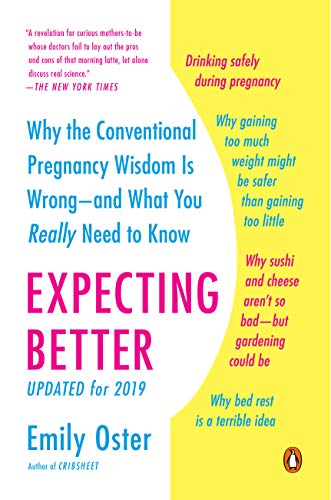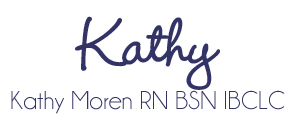4512 Post Road, East Greenwich, RI 02818
401-884-8273
Cribsheet: a data-driven guide to better, more relaxed parenting, birth to preschool by Emily Oster
Dr. Oster’s premise is that data doesn’t always support the common mandates provided to parents regarding what is best for their children. And what I most found most refreshing, is her proclamation that you have a choice in how you parent, which of course, you do. She confesses to being a new Mommy, going down the internet rabbit hole looking for advice about a multitude of subjects, only to be more confused and worried. Haven’t we all done that? And doesn’t the conflicting advice only leave us more stressed out?
The book starts by addressing all the things that no one talks about after having a baby. I vividly remember my three younger sisters, who all gave birth to their first child weeks from each other, looking at me and saying “Why doesn’t anyone tell you about this?” I don’t know, but now someone has! Anticipatory guidance is a beautiful thing, and I try to provide it all the time. Everything is much easier to deal with when you have an idea of what to expect and understand what is normal.
Dr. Oster then tackles the most important parenting topics and addresses the data relevant to each one. My favorites of course are breastfeeding, the current SIDs recommendations, sleep training and vaccinations. But every topic you are concerned about is in there, with a deep dive on the data, analyzed by someone who knows how to do it, and is not currently sleep deprived and emotional. I am looking forward to incorporating her data and recommendations into my presentations. I want to validate what I have been professing all along, but anecdotally, and without the data to prove it.
Some of her key assessments: Breastfeeding support in the home after birth increases breastfeeding success. And of course, breastfeeding is not always easy and/or the right choice for everyone. This is blasphemy when acknowledged by me, I know! But some of you have looked at me with profound relief when I have asked you to consider that it might not be the best option for your family. I consider it an important part of my work to give you options based on my honest assessment of your entire situation and I strive to do that daily.
Other gems are that sleep training and crying it out work, with both parents and babies much happier while sleeping longer. Vaccines don’t cause autism. And my all time favorite realization, that parents need to “put the sleep risks (relative to SIDS) in the context of the risks that we are implicitly accepting every day.” And to realize that “sleep choices have real quality of life impacts.”
I would like to encourage all new families to use this book to make educated decisions about how to parent. My hope is that it will be liberating for you, decrease your stress and give you the confidence you need to be the best parent you can be.
The Nursing Mother's Companion by Kathleen Huggins RN MS
This realistic and reassuring book discusses what to expect when nursing and breaks it down into individual time frames to provide excellent anticipatory guidance for new mothers. It lets you know what is normal, and also what isn't and how to handle it. A must read for anyone who wants to nursing and something you will refer to the entire time you are nursing.
The Ultimate Breastfeeding Book of Answers by Jack Newman MD
Considered the North American expert on breastfeeding, this Canadian pediatrician's book is an excellent resource for mothers who are struggling and trying to sift through differing advice. I especially like his advice for those experiencing sore nipples and the recommendation that fixing the latch, fixes everything.
Healthy Sleep Habits, Happy Child by Marc Weissbluth MD
By far my favorite book, because I am a big fan of sleep, and think when a baby isn't sleeping that it affects the whole family. Known as the "Crying It Out Doctor," his contention and mine is that if you follow his advice when your baby is young, there will be no need to cry it out. Baby's have a natural circadian rhythm and if parents accommodate it, life can be pretty nice. It is much easier to do that than make your baby accommodate you. We offer a monthly sleep class in our office that addresses this issue.
Child of Mine: Feeding with Love and Good Sense by Ellen Satter RD
This University of Wisconsin nutritionist developed the "division of responsibility in feeding" our children. It is our responsibility to make good healthy food available for our children, and it's up to them to decide if they want to eat it or not. This eliminates the battles that often go on at meal time and helps to prevent the disordered so prevalent in our culture. She discusses the developmental milestones babies should reach before solid food is introduced, what to offer and how to do it. She also helps you understand how breastfeeding fits into the mix when you are beginning to feed your baby solid food.
Colic Solved: The Essential Guide to Infant Reflux and the Care of Your Crying, Difficult-to-Soothe Baby by Bryan Vartabedian MD
This book is written by a pediatric gastroenterologist that is very supportive of breastfeeding. He provides lots of insight and guidance into caring for babies with reflux, GI distress, and lactose intolerance.
The Breastfeeding Mother's Guide to Making More Milk by Diane West and Lisa Marasco
Almost every mother struggles with her supply at some time and this book provides many great ideas to help increase it. I especially like it for its discussion of mammary hypoplasia, a condition in which a woman doesn't have enough actual milk producing tissue in her breasts. I have had several patients very relieved to find confirmation of a physical reason for their low supply.
Defining Your Own Success: Breastfeeding after Breast Reduction Surgery by Diane West
A must read for anyone who hopes to breastfeed after having a reduction. Provides realistic expectations and explanations of what effect different types of breast surgery can have on breastfeeding.
The Nursing Mother's Guide to Weaning by Kathleen Huggins RN MS and Linda Zeidrich
Excellent advice on how to decide when the time is right to start weaning your baby and bring nursing to a gentle close.
Mothering Multiples by Karen Kerkhoff Gromada
This book is a favorite of our own fabulous RNs who are raising twins.
Touchpoints: Birth to Three by T. Berry Brazelton MD
This Boston pediatrician developed the concept of a "touchpoint" and details developmental touchpoints in this book. A period of developmental growth, a touchpoint is also fraught with parental anxiety and family chaos, as we keep doing what always worked, and no longer does. This book helps you to see what is happening and makes it a lot easier to anticipate it, deal with it, and move on.
1-2-3 Magic: Effective Discipline for Children 2 to 12 by Thomas Phelan PhD
A fantastic book to help you learn how to resist engaging in the negotiations we all fall prey to when we try to convince our kids to do what we want and behave.
Down Came the Rain: My Journey Through Postpartum Depression by Brooke Shields
Advice from a very public figure who shares her struggle after the birth of her first daughter and provides guidance on how to get through it.
The Gift of An Ordinary Day: A Mother's Memoir by Katerina Kenison
Just a darn good book! I read it when my oldest was about 17 and my youngest was 7, at the height of my maternal anxiety. I really wished I had read it when my boys were all under 10. I think it would have prevented much of my angst and helped me to slow down and just enjoy where they all were when they were there. Can't recommend it enough!






























